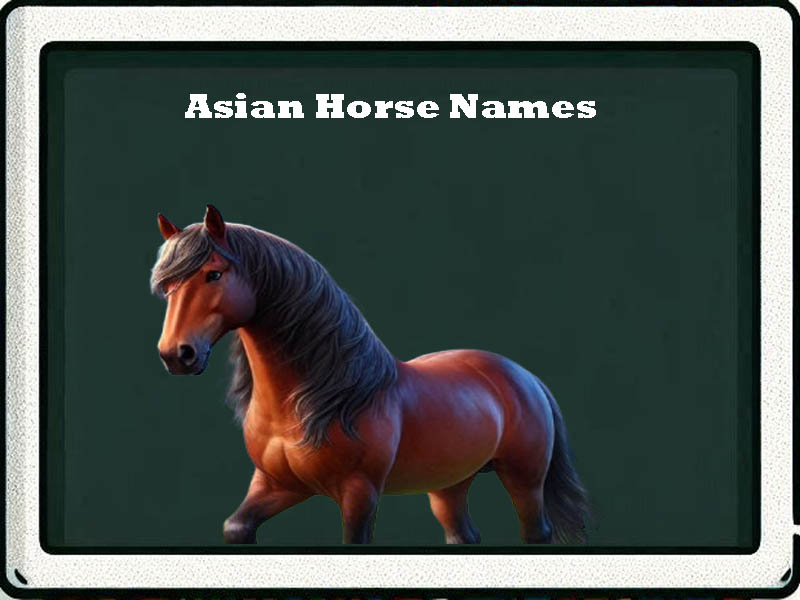Asian Horse Names: Majestic and Timeless Choices for Your Equine Companion
When choosing a horse name, it’s essential to pick one that reflects the majesty and strength of these magnificent creatures. Asian horse names offer a rich cultural history and unique meanings that make them perfect for any stallion or mare.
These names often symbolize traits such as power, beauty, and grace, embodying the equine spirit. Whether you’re looking for names for horses that reflect ancient traditions or modern interpretations, the right name can elevate your horse’s presence.
From the majestic symbols of Asia’s past to the timeless significance of these names, selecting the perfect name for your steed connects you to a profound legacy.
Here are 100 Asian horse names with meanings, divided into male and female categories:
Asian Horse Names, Male
- Raijin – Named after the Japanese God of Thunder, symbolizing power.
- Bai Hu – Meaning “White Tiger” in Chinese, representing strength and courage.
- Khan – A title for a ruler or leader, symbolizing nobility and power.
- Akira – Meaning “bright” or “clear,” ideal for a strong and noble stallion.
- Shiro – A common Japanese name meaning “white,” symbolizing purity and nobility.
- Yamato – Refers to the ancient name of Japan, symbolizing strength and heritage.
- Jiro – Meaning “second son” in Japanese, signifying honor and distinction.
- Genghis – After the legendary Mongol leader, symbolizing leadership and strength.
- Tetsuya – Meaning “wise,” this name embodies intelligence and leadership.
- Sōta – A name meaning “large and strong,” perfect for a powerful horse.
- Miyamoto – A famous Japanese surname, symbolizing samurai spirit and strength.
- Kaito – Meaning “ocean” and “soar,” symbolizing freedom and boundless energy.
- Kumiko – A traditional name meaning “eternal,” symbolizing endurance.
- Chong – A strong and powerful name from Chinese culture.
- Kirin – A mythical creature from Chinese mythology, symbolizing peace and prosperity.
- Haru – Meaning “spring” in Japanese, symbolizing renewal and life.
- Raiden – Meaning “thunder and lightning,” perfect for a powerful horse.
- Tadashi – Meaning “loyal,” ideal for a horse known for its unwavering loyalty.
- Zhou – A common Chinese surname, symbolizing strength and power.
- Yamato – A symbol of Japan’s ancient history, symbolizing nobility and valor.
- Hanzo – A Japanese name meaning “half,” symbolizing resilience.
- Ryu – Meaning “dragon,” symbolizing power, courage, and wisdom.
- Xian – A name meaning “immortal,” symbolizing endurance and strength.
- Wang Wei – A Chinese name meaning “powerful,” ideal for a strong and brave horse.
- Kaito – Meaning “soaring through the sea,” symbolizing freedom.
- Kyo – A name meaning “capital,” signifying importance and power.
- Shen – Meaning “divine,” representing divine strength and power.
- Jiang – Meaning “river,” symbolizing flow and strength.
- Yuki – Meaning “snow,” symbolizing purity and calmness.
- Shinji – Meaning “true” and “benevolent,” ideal for a noble and loyal horse.
- Ryuji – Meaning “dragon child,” perfect for a mighty and legendary steed.
- Vishnu – A name from Hindu mythology, symbolizing protection and wisdom.
- Ryuuken – Meaning “dragon fist,” symbolizing immense strength and power.
- Zhang – A common Chinese surname symbolizing resilience and power.
- Takumi – Meaning “artisan,” ideal for a meticulous and hardworking horse.
- Kenzou – Meaning “wise man,” reflecting intelligence and strength.
- Moku – A name from Japanese culture meaning “tree,” symbolizing rootedness and stability.
- Daiki – Meaning “great radiance,” symbolizing brilliance and honor.
- Sora – Meaning “sky,” symbolizing freedom and vastness.
- Toru – A name meaning “to climb,” symbolizing resilience.
- Bodhi – Meaning “awakening” in Sanskrit, symbolizing enlightenment and wisdom.
- Shuji – A Japanese name meaning “honest,” reflecting integrity.
- Chao – Meaning “bright” in Chinese, representing intelligence and power.
- Mochi – A sweet, traditional Japanese food, symbolizing warmth and tradition.
- Kenshin – Meaning “heart and mind,” perfect for a horse that embodies both.
- Seiji – A name meaning “righteous,” symbolizing honor and integrity.
- Riku – Meaning “land,” symbolizing steadiness and strength.
- Liu – A Chinese surname meaning “willow,” symbolizing grace and beauty.
- Goro – A name meaning “fifth son” in Japanese, representing honor and dignity.
- Mei Ling – A Chinese name meaning “beautiful and delicate,” symbolizing elegance.
Asian Horse Names, Female
- Lian – Meaning “lotus flower,” symbolizing beauty and purity.
- Suki – A name meaning “beloved,” perfect for a horse who is cherished.
- Mingmei – Meaning “bright and beautiful,” ideal for a graceful mare.
- Yumi – A name meaning “archery bow,” representing strength and precision.
- Yuki – Meaning “snow,” perfect for a white or pure-hearted horse.
- Tao – Meaning “way” or “path,” symbolizing spiritual journey and wisdom.
- Sakura – Referring to the cherry blossom tree, symbolizing beauty and fleeting life.
- Amaya – Meaning “night rain,” perfect for a mysterious or calm mare.
- Keiko – Meaning “happy child,” ideal for a cheerful and energetic horse.
- Hina – Meaning “sunlight,” representing warmth and radiance.
- Kiko – Meaning “chronicle child,” symbolizing a horse with a rich history.
- Fujiko – Meaning “wisteria child,” symbolizing elegance and grace.
- Mai – Meaning “dance,” symbolizing elegance and fluidity.
- Chunhua – Meaning “spring flower,” symbolizing new beginnings.
- Leila – A name meaning “night,” perfect for a dark-colored or mysterious horse.
- Xiulan – Meaning “beautiful orchid,” symbolizing elegance and beauty.
- Mei – Meaning “beautiful,” perfect for a stunning mare.
- Shiori – Meaning “bookmark,” symbolizing someone who is remembered or cherished.
- Yuka – Meaning “gentle flower,” symbolizing kindness and beauty.
- Hana – Meaning “flower,” representing grace and natural beauty.
- Kiku – Meaning “chrysanthemum,” symbolizing beauty and endurance.
- Kaori – Meaning “fragrance,” perfect for a mare with an alluring presence.
- Suki – Meaning “beloved,” reflecting affection and adoration.
- Kira – A name meaning “sparkle,” symbolizing brightness and energy.
- Emiko – Meaning “smiling child,” reflecting happiness and joy.
- Yumi – A name meaning “archery,” symbolizing skill and precision.
- Keiko – Meaning “happy child,” representing cheerfulness.
- Aiko – Meaning “child of love,” perfect for a horse who is deeply loved.
- Chika – Meaning “wisdom,” symbolizing intelligence and grace.
- Natsuki – Meaning “summer hope,” representing optimism and warmth.
- Asami – Meaning “morning beauty,” symbolizing new beginnings.
- Tina – A name meaning “fair,” symbolizing justice and balance.
- Haruka – Meaning “spring flower,” representing beauty and natural grace.
- Jia – Meaning “good” or “family,” reflecting loyalty and protection.
- Nori – Meaning “doctrine,” symbolizing wisdom and inner strength.
- Miyuki – Meaning “beautiful snow,” perfect for a graceful and pure horse.
- Yukari – Meaning “bind,” symbolizing connection and loyalty.
- Yoshiko – Meaning “good girl,” representing virtue and goodness.
- Ayame – Meaning “iris,” symbolizing elegance and purity.
- Riko – Meaning “jasmine,” reflecting beauty and delicacy.
- Hiyori – Meaning “weather,” symbolizing adaptability and change.
- Miku – Meaning “beautiful sky,” representing freedom and expansiveness.
- Sayaka – Meaning “clear,” symbolizing clarity and vision.
- Reina – Meaning “queen,” representing leadership and nobility.
- Liu – A common Chinese surname meaning “willow,” symbolizing flexibility and grace.
- Naomi – Meaning “pleasant,” perfect for a sweet-tempered mare.
- Nina – Meaning “grace,” symbolizing beauty and elegance.
- Zhen – Meaning “precious,” symbolizing value and rarity.
- Meiling – Meaning “beautiful and delicate,” reflecting charm.
- Xia – Meaning “glow,” symbolizing light and brilliance.
Asian Horse Names: A Fusion of Myth, Culture, and Beauty
Asian horse names are deeply intertwined with the rich culture and language of the region, drawing inspiration from ancient traditions, mythology, and the natural beauty of the land. These names often carry powerful meanings, representing strength, elegance, and divine connections.
A mare or stallion with an Asian name can evoke images of mythical creatures like the dragon, or ancient legends from Chinese mythology such as the Three-legged crow or Yinglong, a mythical Chinese dragon with the ability to control rainfall and water.
In China, horse names are often tied to the animal’s physical characteristics, such as a chestnut color, or their breed, with famous pony breeds being cherished in regions like Central Asia.
Names like Tian, meaning “heaven,” or Siming, a deity in Chinese culture, evoke divine protection or grandeur, making them perfect for a foal destined for greatness.
In Chinese mythology, the child of the Solar deity is often depicted as a figure of great importance, symbolizing new beginnings and the promise of future prosperity, much like the majestic horses that grace the culture’s rich history.
Chinese culture often celebrates symbolic figures such as Nüwa, the mother goddess, or Pangu, the creator of the world. These figures are revered for their connection to myth and the cosmos, imbuing the horse with a sense of strength and purpose.
Many horse names are also inspired by the solar deity, representing light, power, and vitality. Fuxi, the ancient Chinese culture sage, is another name that symbolizes wisdom and leadership.
In the United States, Asian horse names have become a trend, often incorporating traditional elements from China and Central Asia. These names bring a sense of global beauty and heritage to the equestrian world.
Whether naming a foal or an adult stallion, choosing an Asian name can add depth and meaning to the horse’s identity, aligning with the myths, deities, and natural world that have long shaped the region’s culture.
Names like Kitchen God remind us of the importance of domestic peace and harmony, while names like Yinglong and Tian reflect the grandeur of the horse’s role in history and mythology.
Ultimately, Asian horse names are not only a reflection of the horse’s beauty but also a nod to the deep history of mythological figures, divine creatures, and solar deities that have shaped the way horses are perceived across cultures. The names carry layers of meaning, linking these majestic creatures to the legends of the past while celebrating their present-day role as noble steeds.




-0 Comment-